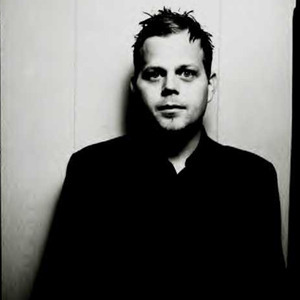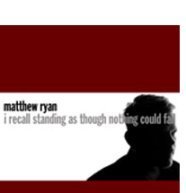An interview with Matthew Ryan
This is the second interview we've conducted with singer/songwriter Matthew Ryan, whose 9th studio album I Recall Standing As Though Nothing Could Fall was recently released, and I've gotta say: I've honestly never met a more approachable professional musician (nor have I met one as grammar-conscious). Ryan recently took time out of his schedule (he's currently on tour with his band the Red Needles) to discuss the new album as well as his views on songwriting as a craft.
1. You recently moved from Nashville. Tell us a little about what led to that.
I've actually moved to a small town northwest of Pittsburgh. Real severe landscape and that particular architecture that expects cold weather. Lots of bridges and old stone churches. It's a town I fell in love with over the course of the last ten years and several visits. It feels a bit like Woodstock, NY. I felt it was time for a change; if you live one place for too long you can start to live in the past that you built there. I felt change was almost overdue and I needed to reengage with the present, shake it up, look at different streets, buildings and places, hear different accents. Nashville was great to me, and I'll miss the day to day with many of my friends. But it was time to move on.
2. So, let's talk about the new album, I Recall Standing As Though Nothing Could Fall. You started recording in your home studio a few albums back, and you began this one last year, and from what I understand you finished it in nine months, is that correct? What was that process like? How do you think recording at home has changed your songwriting process, if at all? Is there a greater degree of freedom, an incentive to experiment?
It did take 9 months, maybe 10. It was a bear. I had no choice with this album, but these songs insisted on coming together at this particular time. It wasn't the album I intended to make, but whatever it is that pulls these things from you should be respected. The times we're living in are provoking action, and for me that generally manifests itself in songs. So I hunkered down with it, did all I could to honor it and tell the truth as I see it as best I could. As far as the approach, it's a utilitarian philosophy that drives the process. I have 3 recording systems at home and options outside my home to work with others in various studios when the songs dictate. It's really about curiosity and following what excites me.
The last couple albums have been more home projects that were followed through at the pace of what the creativity allowed along with great contributions from friends. I love working at home because there's no acting, the songs are captured at the moment they arrive. Seems to me there's a certain purity to that because the moment a song is finished it can be difficult to reengage with that original spark and it can often just become performance. The approach will continue to adapt to what the work requires. I feel an earthier album coming. But we'll see, the muse has been stubborn lately.
3. I've done my best to keep up with interviews you've done, and one thing I've noticed that a lot of them seem to have in common is the tendency of the interviewers to comment on the perceived "grimness" of your music, which comments are usually followed by you politely pointing out that you really don't perceive your work as "grim" at all. What is it about the way in which you craft songs that you think leads people to often view it in such a way?
 I really don't know, Jeremy. I don't know what lives those that say those things are living. Everyone I know is suffering some sort of weight, some sort of heartache. And through happiness, beauty and great events in our lives there are other plots. My songs engage with all of it and above all want you to persevere. There's so much we don't know, the world we're sharing is beautiful and hard. There's great wealth and great despair. And I guess there's a part of me that feels it's wrong to whistle past the graveyard, so to speak. And some may view that as a bummer, and maybe that's what they're really saying. I understand the need for escapism and preoccupation. There's plenty of music for that, but that's not my lot. I've always felt stronger and ultimately comforted by confronting what daunts or troubles me. I guess that's what my work hopes to offer: a certain beauty or resilient poetry to the harder things in living. Life is beautiful and worth every aching moment, and life is better if we suss it all out.
I really don't know, Jeremy. I don't know what lives those that say those things are living. Everyone I know is suffering some sort of weight, some sort of heartache. And through happiness, beauty and great events in our lives there are other plots. My songs engage with all of it and above all want you to persevere. There's so much we don't know, the world we're sharing is beautiful and hard. There's great wealth and great despair. And I guess there's a part of me that feels it's wrong to whistle past the graveyard, so to speak. And some may view that as a bummer, and maybe that's what they're really saying. I understand the need for escapism and preoccupation. There's plenty of music for that, but that's not my lot. I've always felt stronger and ultimately comforted by confronting what daunts or troubles me. I guess that's what my work hopes to offer: a certain beauty or resilient poetry to the harder things in living. Life is beautiful and worth every aching moment, and life is better if we suss it all out.
4. Following from this, you said in our last interview that you were definitely more of a writer than a talker, and I've noticed in interviews the difficulty that often arises when trying to explain in words what you try to get across with your music. Without a doubt, you're not alone in this regard; most musicians I've spoken to seem to feel that talking is inadequate for conveying their musical goals. What do you think is the hardest part about discussing your music, how you write, and what you hope to accomplish?
I never want to understand how I write. I admire craft, but I prefer that sensation of discovery that the way I work offers. I open myself up to it, and allow it to arrive. The less I think while writing, the better the song is. It's difficult to discuss because with all the punk rock and bravado and all the reasons someone does what I do, I above all have very earnest hopes for what my work accomplishes with listeners.
5. This album comes an interesting time in regard to the sociopolitical climate in America, and it's clear from songs like "I Don't Want a Third World War" that you remain a very socially engaged artist. How do you think the current political, economic, and social discourses in America influenced this album (if at all)?
We're at a very delicate intersection in our country and the world, Jeremy. This album is informed completely and thoroughly by this current friction. "I Want Peace," "Hey Kid," "Third World War," "My Darker Side," "Here Comes The Snow," "Kings Of Trash" and above all "I Still Believe In You" all speak directly to my feelings on the situation and where I believe the solutions are.
6. You've rejected the notion that your work is a kind of complex diary-writing, although you have also claimed music to be a kind of meditation for you. When you write, how much of it is done with the fans in mind? Do you write exclusively for your own peace of mind, or is there an awareness of how your fans might react?
 I rarely have written with listeners in mind. That's not because I don't care, but because my process doesn't flourish that way. And the truth is, whenever I did let notions of what listeners might want or think or feel for a song, well, let's just say things got messy. I've buried every song I ever happened to finish in that fashion. Something just rings untrue about them. My voice requires a certain timbre in intent, language, rhythm and melody. I write because I feel compelled to; it's a beautiful thing that's indescribable. Meditation is a clumsy word for it, but on some level it works because it feels like I'm communing with something greater than myself when I achieve a certain resonance. I only have an awareness of how a listener will react weeks, months and sometimes even years after a song is done. However, there are times I get excited about a song immediately when it feels as though I tapped a particularly rich vein.
I rarely have written with listeners in mind. That's not because I don't care, but because my process doesn't flourish that way. And the truth is, whenever I did let notions of what listeners might want or think or feel for a song, well, let's just say things got messy. I've buried every song I ever happened to finish in that fashion. Something just rings untrue about them. My voice requires a certain timbre in intent, language, rhythm and melody. I write because I feel compelled to; it's a beautiful thing that's indescribable. Meditation is a clumsy word for it, but on some level it works because it feels like I'm communing with something greater than myself when I achieve a certain resonance. I only have an awareness of how a listener will react weeks, months and sometimes even years after a song is done. However, there are times I get excited about a song immediately when it feels as though I tapped a particularly rich vein.
7. You very recently performed at the Replacements Tribute at Bowery Electric. What is your favorite Replacements tune? (If your answer is anything other than "Alex Chilton," "Left of the Dial," or "Can't Hardly Wait," then you are wrong and I pity you.)
Ha! "Can't Hardly Wait" is on my list, so I guess I've escaped your pity. I also love "Skyway," "Here Comes A Regular," "The Ledge," "Achin' To Be," "Bastards Of Young," "A Little Mascara" and "I'll Be You" is a great rock n roll song regardless of all the slack Don't Tell A Soul gets. There's too many to list to be absolutely honest.*
Well played, sir. You can check out the new album, tour dates, interviews, and Matthew Ryan's discography here.











